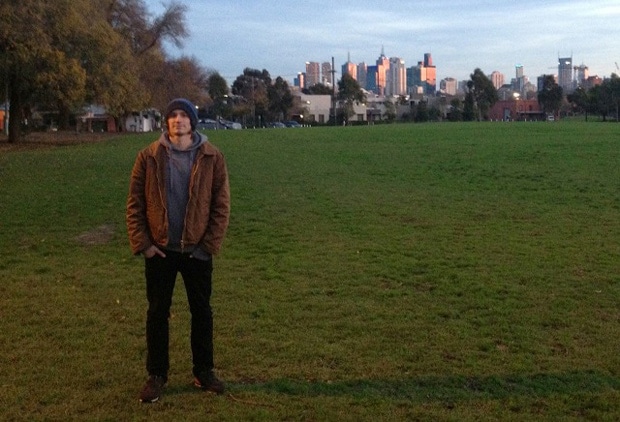The life of the formidable Carlton captain Bob Chitty, his role in the infamous “Bloodbath” Grand Final, and his relationship with his brothers through the dark days of the Second World War, are the cornerstones of a sweeping tale to be developed into an Australian feature by a local Melbourne film maker.
Bill Irving, a graduate of RMIT’s Screenwriting and Screen Production Programs, said his intent to make the film was based on a childhood reverence for the game’s most infamous Grand Final and for Chitty the man.
“This story has been with me for a long time,” Irving said at Visy Park, where that most infamous of contests was waged before a record crowd, many of them returned servicemen in slouch hats.
“I remember reading the story of ‘The Bloodbath’ in ‘100 Years of Football’. The book carried that famous Truth newspaper front page ‘Pictures of Bash from Bash-ball’ with an image of Bob Chitty sporting a gash above his eye and from that moment I decided ‘I want to make a film about that’.
“I had no idea how I was going to do it – I just knew that I wanted to. It had something to do with the notoriety of that event.”
The 1945 Grand Final – when Chitty’s men won them and wore them for Carlton’s seventh Premiership in the year of victory and peace – drew almost 63,000 people (standing room only) to Princes Park.
A total of ten players - six from South Melbourne, four from Carlton - were summoned to answer a collective tally of 16 offences ranging from striking, to abusive language, to throwing the ball away. The aptly-named South centre half-back Jack “Basher” Williams, who copped 12 weeks for adopting a fighting attitude” towards a goal umpire that September Saturday, is accused of igniting the powder keg by decking Ken Hands early on in proceedings.
Chitty, who earned eight weeks for elbowing South’s Billy Williams, was in turn felled by South’s Laurie Nash, but somehow managed to boot a team-lifting goal in a crucial moment of Carlton’s 28-point triumph.
For Irving, Chitty is the “outlaw football hero”. Born in 1916 in Tindaldra north-east of Corryong in the shadows of the Snowy Mountains, Chitty memorably played the part of Ned Kelly in Rupert Kathner’s feature “The Glenrowan Affair”, landing the plum role in part because he could ride a horse through the backblocks of Benalla where the film was shot in 1948.
But Irving believes there’s a bigger story here. The story of men being tested.
“I started thinking more about motivation - of the motivation of young men to play football on one hand at a time when others went to war,” he said.

Melbourne film maker Bill Irving. (Photo: Supplied)
“It’s erroneous to say football mirrors war. That’s foolish. However, the physical motivations of young men both on a football field and the theatre of war are illustrated through the Chitty boys, with Bob playing in ‘The Bloodbath’ and his brothers serving abroad.”
Arthur “Tox” Chitty, considered the best footballer of the clan, was killed at El Alamein whilst on active service with the 2/23 Australian infantry Battalion. Two more brothers Ron and Phil were taken prisoners of war by the Germans and later released, while Peter, a two-game St Kilda player, famously earned the “Changi Brownlow Medal” for being best afield in a match involving Victoria and the rest at the prison camp.
Irving was fascinated that the greater proportion of Bob’s 147 games for Carlton came through the war years at a time when his brothers played for infinitely higher stakes.
“One of his brothers was killed; another lived through hell in Changi and was marched to the Burma Railway, and they all played down their heroism,” Irving said.
Irving is now in the throes of completing a treatment for the film that he and Buffalo Films producer Jessica Mitchell will soon submit in order to obtain seed funding through Screen Australia. His grand plan is that the film will be completed by late 2015, to premiere on or around the 70thanniversary of “The Bloodbath”’. . . and then he’ll ride off into the sunset just as Bob did at Benalla.
As he said: “I believe that while I‘m capable of making films “I feel I’ve only got one film in me – and this is it”.


